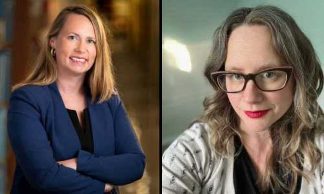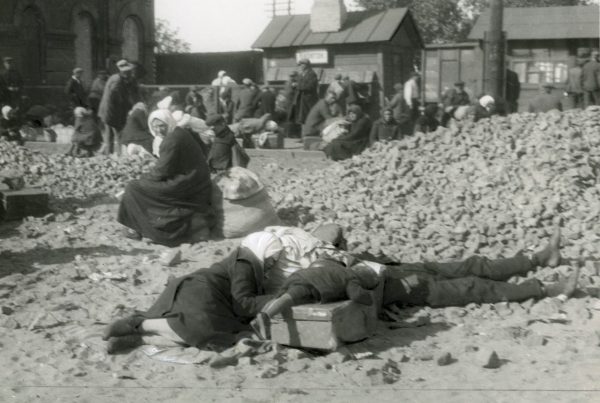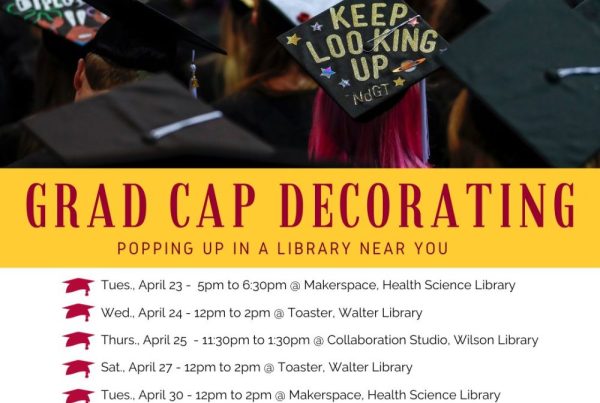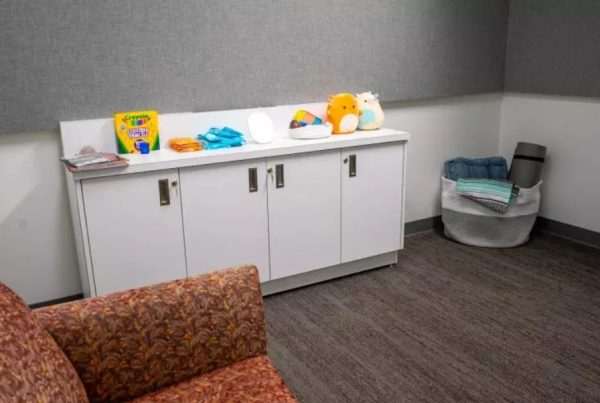By Allison Campbell-Jensen
Months can pass between submitting applications and notification of awards in the world of grants. Thus, the University of Minnesota Libraries’ Science Librarian Megan Kocher and Social Sciences Librarian Amy Riegelman faced circumstances turned upside down by COVID in fall 2020, when they were notified they received a grant from the Institute of Museum and Library Services (IMLS) Laura Bush 21st Century Librarian Program.
Because of COVID restrictions on travel, they and their associated colleagues at Cornell University and Carnegie Mellon University no longer had the opportunity to offer the planned no-cost, in-person training to academic library staff at sites around the country.
So the team stepped back, thought again, and came up with a virtual training program that reached many more participants than previously imagined, including librarians overseas — a feat that recently earned them acclaim as the 2022 Minnesota Academic Innovators.
In the nominating letter, the University Libraries’ Director of Sciences, Agriculture, and Engineering, Philip Herold, noted that “over the course of the grant, hundreds of librarians in a broad range of disciplines are being trained in best practices in supporting evidence synthesis at their own institutions and thus improving the quality of research and publications which are utilized to inform practice and policy. An improved understanding of evidence synthesis methods extends far beyond the growing community of librarians being trained to other library staff at their institutions and in their regions and impacting a vast number of disciplinary researchers outside of librarianship being supported by their libraries.”
Generous teachers
Kocher and Riegelman accepted the award virtually on May 6, from the Minnesota Academic & Research Libraries Division of the Minnesota Library Association.
“We are hugely honored. Putting together the Evidence Synthesis Institute was very much an exercise in creating the community and support we wanted to see around evidence synthesis outside the health sciences,” says Kocher. “I am blown away by what has come of it. We are so lucky to have talented and generous colleagues that we have collaborated with on this. … I’m so grateful for the support we’ve gotten from the University of Minnesota, IMLS, and our partners at Cornell and Carnegie Mellon.”
Adds Riegelman: “We have pre-test and post-test data indicating the success and impact of our Institute, but I think my favorite part is reading the comments in the open text section of the post-institute surveys where participants express their appreciation for our approach to teaching.”
Kudos from participants
They and the other instructors from the U of M, Carnegie Mellon, and Cornell were complimented by participants on their humility, generosity, and enthusiasm for sharing this valuable expertise.
Kindness, openness, and an uplifting approach also were mentioned. One participant wrote: “I’ve been a librarian now for 12 years and this was the best workshop/institute I’ve had the chance to attend. I will take what I have learned and process it with my team as we work to continue to develop our service. I’m encouraged by the discussions and hope that you all can help to further encourage discussion and sharing within this community.”
Contacted for this article, Riegelman and Kocher were initially a bit hard to reach, as they were remotely teaching librarians in Africa, which is on a very different time schedule than Minnesota. Evidence that their dedication and flexibility continue to reward their librarian students.
“Amy and Megan have truly been leaders in our profession by not only identifying the emerging need for librarians to support this area of research beyond the health sciences, but then taking the initiative to develop an accessible training model that reaches so many librarians,” says Danya Leebaw, Director of the University Libraries’ Social Sciences Department. “They have also designed a comprehensive and effective curriculum that keeps learners engaged, leading to very positive feedback about the workshop experience from attendees.”
About the award
The award is sponsored by the Academic & Research Libraries Division (ARLD) of the Minnesota Library Association. ARLD is a division of the Minnesota Library Association and is also the Association of College and Research Libraries (ACRL) chapter in Minnesota. ARLD’s purpose is to identify and seek solutions to mutual problems on the academic and research library level of librarianship, to improve services, to encourage development of librarians, and to stimulate cooperation among libraries.





